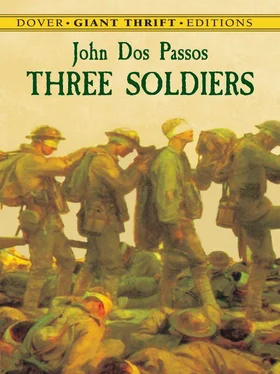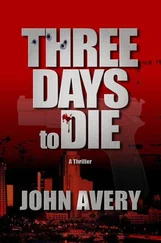“Merci, Monsieur. A bientôt, Monsieur. Au revoir, Monsieur.”
The woman’s singing voice followed him up the rickety stairs to his room. It was only when he had closed the door that he remembered that he had put down for a passport number his army number. “And why did I write John Brown as a name?” he asked himself.
He heard the song so vividly that he thought for an instant someone must be standing beside him singing it. He went to the window and ran his hand through his hair. Outside the Loire rambled in great loops towards the blue distance, silvery reach upon silvery reach, with here and there the broad gleam of a sand bank. Opposite were poplars and fields patched in various greens rising to hills tufted with dense shadowy groves. On the bare summit of the highest hill a windmill waved lazy arms against the marbled sky. Gradually John Andrews felt the silvery quiet settle about him. He pulled a sausage and a piece of bread out of the pocket of his coat, took a long swig of water from the pitcher on his washstand, and settled himself at the table before the window in front of a pile of ruled sheets of music paper. He nibbled the bread and the sausage meditatively for a long while, then wrote “Arbeit und Rhythmus” in a large careful hand at the top of the paper. After that he looked out of the window without moving, watching the plumed clouds sail like huge slow ships against the slate-blue sky. Suddenly he scratched out what he had written and scrawled above it: “The Body and Soul of John Brown.” He got to his feet and walked about the room with clenched hands.
“How curious that I should have written that name. How curious that I should have written that name!” he said aloud.
He sat down at the table again and forgot everything in the music that possessed him.
The next morning he walked out early along the river, trying to occupy himself until it should be time to go to see Geneviève. The memory of his first days in the army, spent washing windows at the training camp, was very vivid in his mind. He saw himself again standing naked in the middle of a wide, bare room, while the recruiting sergeant measured and prodded him. And now he was a deserter. Was there any sense to it all? Had his life led in any particular direction, since he had been caught haphazard in the treadmill, or was it all chance? A toad hopping across a road in front of a steam roller.
He stood still, and looked about him. Beyond a clover field was the river with its sand banks and its broad silver reaches. A boy was wading far out in the river catching minnows with a net. Andrews watched his quick movements as he jerked the net through the water. And that boy, too, would be a soldier; the lithe body would be thrown into a mould to be made the same as other bodies, the quick movements would be standardized into the manual at arms, the inquisitive, petulant mind would be battered into servility. The stockade was built; not one of the sheep would escape. And those that were not sheep? They were deserters; every rifle muzzle held death for them; they would not live long. And yet other nightmares had been thrown off the shoulders of men. Every man who stood up courageously to die loosened the grip of the nightmare.
Andrews walked slowly along the road, kicking his feet into the dust like a schoolboy. At a turning he threw himself down on the grass under some locust trees. The heavy fragrance of their flowers and the grumbling of the bees that hung drunkenly on the white racemes made him feel very drowsy. A cart passed, pulled by heavy white horses; an old man with his back curbed like the top of a sunflower stalk hobbled after, using the whip as a walking stick. Andrews saw the old man’s eyes turned on him suspiciously. A faint pang of fright went through him; did the old man know he was a deserter? The cart and the old man had already disappeared round the bend in the road. Andrews lay a long while listening to the jingle of the harness thin into the distance, leaving him again to the sound of the drowsy bees among the locust blossoms.
When he sat up, he noticed that through a break in the hedge beyond the slender black trunks of the locusts, he could see rising above the trees the extinguisher-shaped roof of the tower of Geneviève Rod’s house. He remembered the day he had first seen Geneviève, and the boyish awkwardness with which she poured tea. Would he and Geneviève ever find a moment of real contact? All at once a bitter thought came to him. “Or is it that she wants a tame pianist as an ornament to a clever young woman’s drawing room?” He jumped to his feet and started walking fast towards the town again. He would go to see her at once and settle all that forever. The village clock had begun to strike; the clear notes vibrated crisply across the fields: ten.
Walking back to the village he began to think of money. His room was twenty francs a week. He had in his purse a hundred and twenty-four francs. After fishing in all his pockets for silver, he found three francs and a half more. A hundred and twenty-seven francs fifty. If he could live on forty francs a week, he would have three weeks in which to work on the “Body and Soul of John Brown.” Only three weeks; and then he must find work. In any case he would write Henslowe to send him money if he had any; this was no time for delicacy; everything depended on his having money. And he swore to himself that he would work for three weeks, that he would throw the idea that flamed within him into shape on paper, whatever happened. He racked his brains to think of someone in America he could write to for money. A ghastly sense of solitude possessed him. And would Geneviève fail him too?
Geneviève was coming out by the front door of the house when he reached the carriage gate beside the road.
She ran to meet him.
“Good morning. I was on my way to fetch you.”
She seized his hand and pressed it hard.
“How sweet of you!”
“But, Jean, you’re not coming from the village.”
“I’ve been walking.”
“How early you must get up!”
“You see, the sun rises just opposite my window, and shines in on my bed. That makes me get up early.”
She pushed him in the door ahead of her. They went through the hall to a long high room that had a grand piano and many old high-backed chairs, and in front of the French windows that opened on the garden, a round table of black mahogany littered with books. Two tall girls in muslin dresses stood beside the piano.
“These are my cousins… Here he is at last. Monsieur Andrews, ma cousine Berthe et ma cousine Jeanne. Now you’ve got to play to us; we are bored to death with everything we know.”
“All right… But I have a great deal to talk to you about later,” said Andrews in a low voice.
Geneviève nodded understandingly.
“Why don’t you play us La Reine de Saba, Jean?”
“Oh, do play that,” twittered the cousins.
“If you don’t mind, I’d rather play some Bach.”
“There’s a lot of Bach in that chest in the corner,” cried Geneviève. “It’s ridiculous; everything in the house is jammed with music.”
They leaned over the chest together, so that Andrews felt her hair brush against his cheek, and the smell of her hair in his nostrils. The cousins remained by the piano.
“I must talk to you alone soon,” whispered Andrews.
“All right,” she said, her face reddening as she leaned over the chest.
On top of the music was a revolver.
“Look out, it’s loaded,” she said, when he picked it up.
He looked at her inquiringly. “I have another in my room. You see Mother and I are often alone here, and then, I like firearms. Don’t you?”
“I hate them,” muttered Andrews.
“Here’s tons of Bach.”
“Fine… Look, Geneviève,” he said suddenly, “lend me that revolver for a few days. I’ll tell you why I want it later.”
Читать дальше












